Organizing Successful Company Workshops: Expert Tips and Insights

Organizing a workshop is both an art and a science, requiring meticulous attention to detail and foresight for success.
Every aspect, from selecting the right venue to setting the agenda, plays a critical role.
To help you achieve an impactful and engaging workshop, we’ve compiled expert tips from industry professionals Emma Buchet, Paula Deschamps Madeira, Adrianna Podgorska, and Karolina Chalecka. Their insights cover everything from preparation to follow-up for a productive experience.
🎉 Psst…psst, there’s a free workshop checklist template included!
1. Understand Your Audience
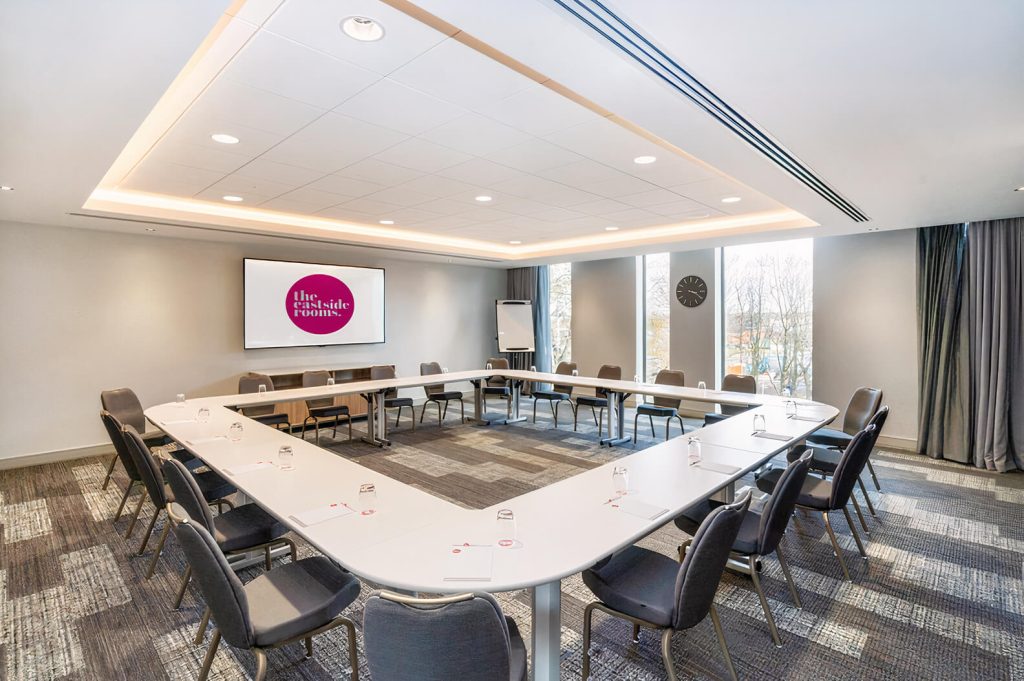
“What do we need to achieve by the end of this workshop?”
- Paula Deschamps Madeira, an experienced UX architect and author of the article “How to Plan and Prepare Great Workshops,” emphasizes the importance of asking yourself — and answering — this exact question.
Customizing the workshop content to fit the participants’ specific needs and the context is crucial. Incorporating relevant examples, methodologies, and case studies makes the material more engaging and applicable.
In short, knowing your audience helps make the content impactful, guaranteeing that your attendees leave with valuable hands-on knowledge.
💁🏽♀️You may like: The Ultimate Checklist for Choosing a Venue
2. Define Clear Objectives
Before planning, clarify what you want to achieve with your workshop.
- Emma Buchet, Lead Copywriter at QbD Business & Communications and author of Some Insights into How to Host a Successful Workshop, mentions that while it may seem obvious, we often get sidetracked by content and the urge to include more information.
It’s important to focus on one central theme and build your workshop around it.
3. Thoroughly Prepare
Preparation is key to a smooth workshop. Create and review your presentation well in advance, says Emma Buchet in her article Some Insights into How to Host a Successful Workshop.
She also stresses the importance of practice: “Rehearse your presentation multiple times, both alone and with your team.”
- Paula Deschamps Madeira advises, “Once you understand the stage you are in and your goals, it will be much easier to define the best methods to use and how the structure of your workshop should look.”
Adrianna Podgórska, Recruitment & EB Specialist at Tagvenue, emphasizes the importance of clarity: “Explain the workshop’s goal and make it easy to understand for everyone. Keep your content simple and use language that’s easy to grasp.”
Karolina Chalecka, Talent Acquisition Specialist at Tagvenue, advises being selective about the information you present. “Focus on key points, as participants are unlikely to remember everything when they leave the workshop.”
4. Create an Interactive Experience
- Emma Buchet emphasizes the role of interaction, writing that “your workshop should not be a presentation of knowledge that someone could find on Google but should be an interactive session that truly educates your audience. Engage your participants and answer their questions at the end.”
A workshop should be more than just a lecture. This keeps the energy high and maintains engagement.
Karolina Chalecka suggests: “Blend team-building activities with your workshop content to create a positive and productive atmosphere.”
Start with icebreaker games to help participants relax and connect.
Breaking participants into smaller groups for exercises also encourages collaboration and builds confidence. This makes it easier for discussion among the larger group as well.
💁🏽♀️You may like: The Conference Planning Checklist
5. Use Simple and Engaging Slides
Keep your slides minimal and visually appealing.
- Karolina Chalecka advises: “Use minimal text, bullet points, and visuals to make slides easy to follow and engaging.”
Avoid clutter to maintain clarity and focus.
6. Provide Additional Resources
Offer extra materials for those interested in exploring further.
- Karolina Chalecka suggests including reading lists, website links, or recommended books to support continued learning after the workshop.
7. Select the Right Methods
Choose workshop methods that align with your goals and audience.
Paula Deschamps Madeira advises selecting techniques that match your workshop’s stage and time constraints, especially in design or UX contexts.
Understanding where attendees are in their learning journey is crucial for choosing appropriate methods. Testing new methodologies can also guarantee they meet your workshop’s needs.
💡 To identify where the employees or attendees are in their learning journey, you can use the following methods:
- Pre-Workshop Surveys: Distribute surveys before the workshop to gather information about the attendees’ current knowledge and experience levels.
- Initial Assessments: Conduct a quick assessment at the beginning of the workshop to gauge participants’ understanding. This can be in the form of quizzes, polls, or interactive discussions.
8. Manage Time Effectively
“Adhere strictly to your time frame to respect participants’ schedules and keep the workshop focused and organized.” — Adrianna Podgórska
Time management is crucial in workshops. No one wants to spend their day on content they could easily find elsewhere or to leave without retaining key information.
Paula Deschamps Madeira recommends doing trial runs if the workshop format is new to you. Practice with colleagues to ensure everything is clear and well-timed.
Plan how long each activity will take and always allocate extra time to keep everything on track. Better to finish a section or activity under time than to continuously run over.
9. Create a Welcoming Atmosphere
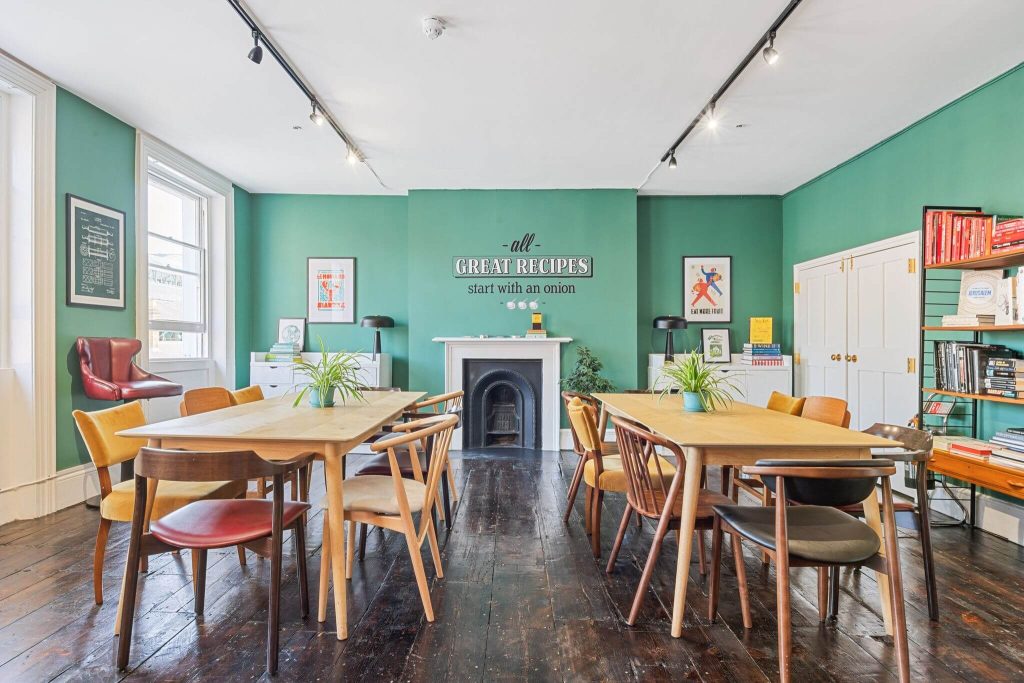
Make participants feel comfortable and valued by adding personal touches, such as name tags and a friendly introduction to get everyone engaged.
- “While addressing the whole audience, break participants into smaller groups for exercises. People tend to be more cooperative and confident in smaller groups,” suggests Karolina Chalecka.
Consider the venue as well, it plays an important and understated role. The venue you choose should be comfortable, accommodate all participants without overcrowding, and provide group discussion spaces.
Paula Deschamps Madeira highlights the importance of deciding whether the workshop will be face-to-face or online.
For in-person workshops, she recommends reserving a room and gathering necessary materials like post-its and pens.
For online workshops, choose the right platform, ensure you have breakout room capabilities, and be aware of any time limits.
10. Prepare for Technical Issues
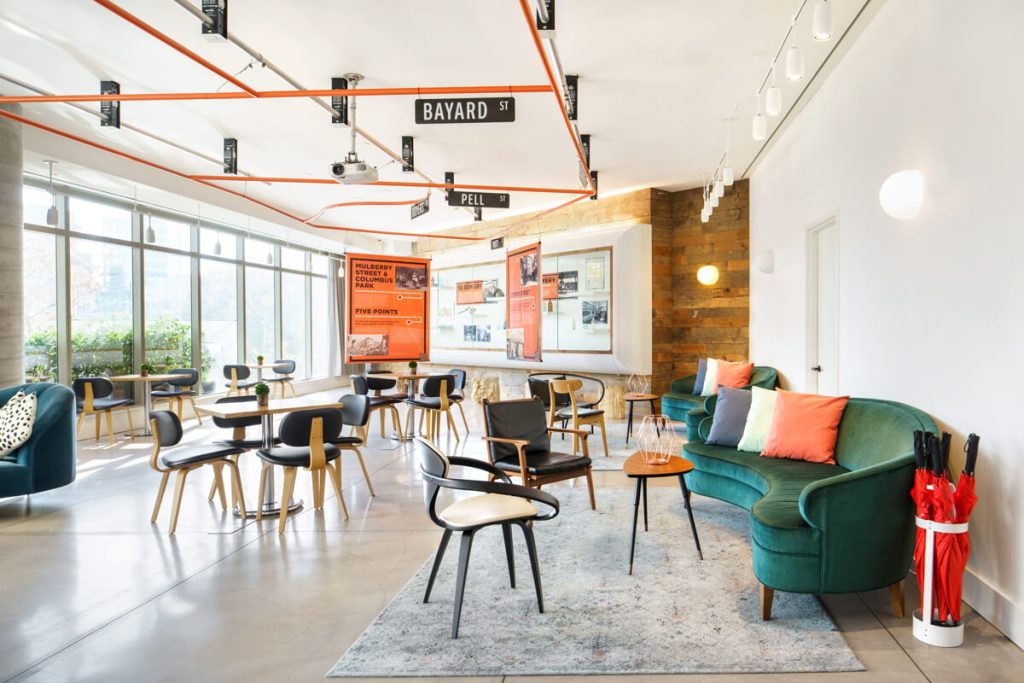
Technical issues can disrupt the flow of your workshop and impact participant engagement. By testing everything beforehand, you can identify and resolve problems before they affect your session.
For instance, ensure your microphone is clear and interference-free, and verify that your laptop is properly connected to the projector. Check that the projector’s image is sharp and correctly aligned, and the powered speakers function without distortion.
Have a backup plan ready for any potential glitches. This could include having extra cables, adapters, and batteries on hand, and quickly switching to alternative equipment.
If you’re using a presentation tool, have a backup copy of your presentation in various formats (for example, USB drive, cloud storage) to access quickly if something goes wrong.
By preparing meticulously and having contingency plans, you can minimize disruptions and maintain a professional, seamless experience for your participants.
11. Encourage Diverse Perspectives

Foster a rich exchange of ideas by encouraging all participants to contribute. Ask questions, organize activities, and mix up team compositions to bring a variety of viewpoints into the discussion.
- Adrianna Podgórska’s method of creating randomly selected groups is particularly effective. She notes that at Tagvenue, specialists from different teams rarely work together, so mixing them together during a workshop helps integrate diverse viewpoints and sparks innovative thinking.
By combining their varied knowledge and “clashing” ideas, teams can think outside the box and contribute to larger projects that impact the entire company.
This approach enhances creativity and encourages collaboration as well as the development of groundbreaking ideas.
💁🏽♀️You may like: 9 Inspiring Ideas for Your Next Networking Event
12. Be Flexible and Adaptable
- Emma Buchet encourages presenters to be prepared to adjust their plans based on real-time feedback and participant needs.
Flexibility helps address any issues that arise and keeps the workshop engaging, but it also demonstrates a willingness to listen and help the audience. It also adds an element of dynamism to a workshop and can even be a fun experience for both host and attendee.
13. Incorporate Feedback Mechanisms
At the end of the workshop, gather feedback from participants to understand what worked well and what could be improved. Karolina Chalecka highlights the value of this insight in refining future workshops and ensuring they better meet participants’ needs.
💁🏽♀️You may like: The Ultimate Meeting Planning Checklist for a Productive Event
Other Things to Consider When Hosting a Workshop
14. Location
Choosing a venue close to participants can save travel costs, but offsite locations might be better if your office lacks suitable spaces.
A new environment can boost creativity and engagement. Spending more on a good venue is worth it for better interactions and a more effective workshop.
15. Space
Choose a room that’s spacious enough to fit all participants comfortably and allows for movement and interaction.
Consider the concept of proxemics, which studies personal space, to create a comfortable setting where participants can engage freely.
Proxemics is important because it helps ensure that everyone feels at ease and respected, promoting better communication and collaboration. Additionally, understanding proxemics can prevent discomfort and distractions.
💁🏽♀️You may like: How Much Does it Cost to Hire a Meeting Room in 2024?
16. Environment
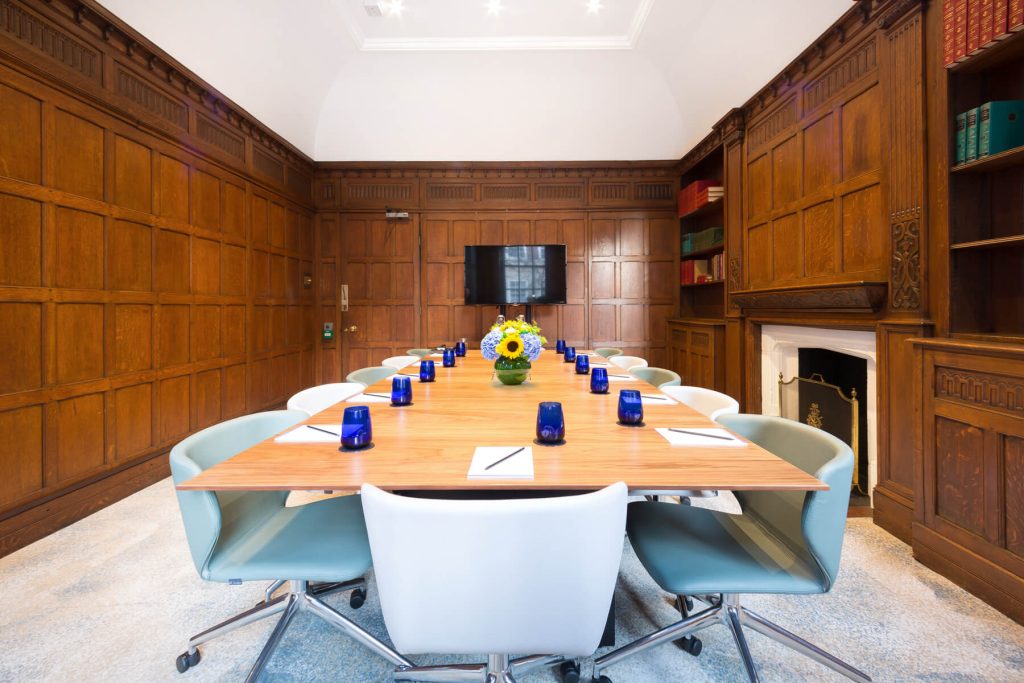
The workshop environment greatly influences the participant experience.
Choose a space that promotes focus and enjoyment. Ensure good air quality, proper lighting, and comfortable temperature control. Natural light is a plus as it boosts productivity. Additionally, consider playing background music to make the environment more welcoming.
17. Furniture and Seating Configuration
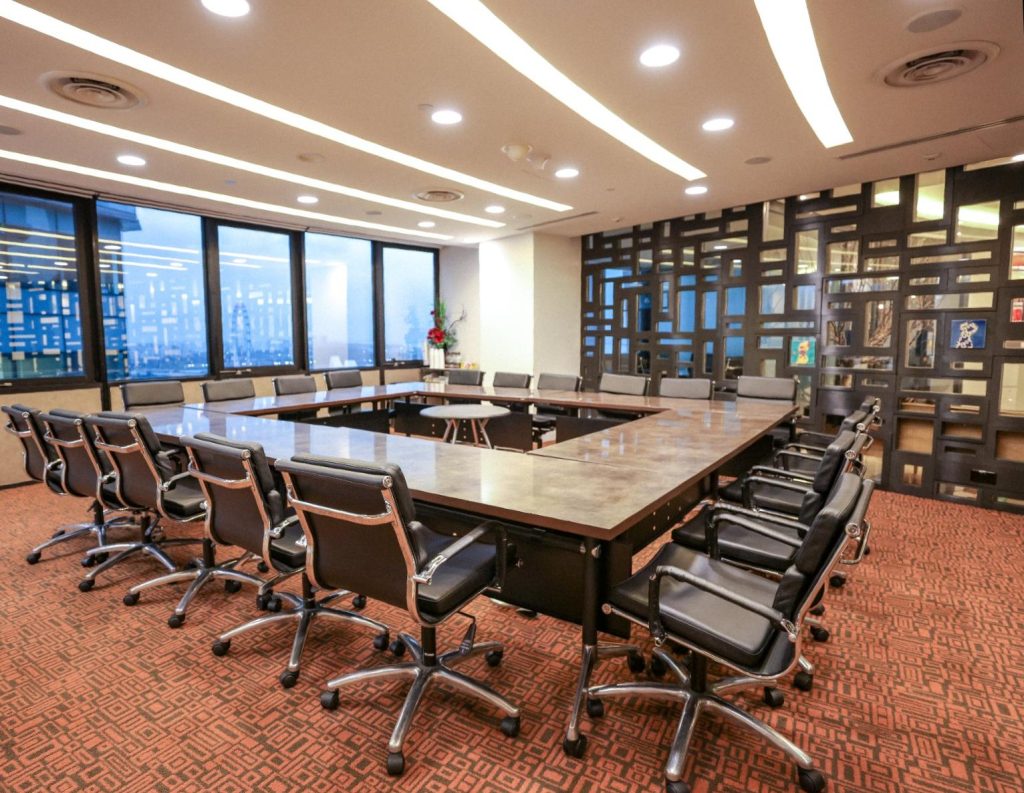
Choose venues with flexible furniture and seating arrangements so that you have enough chairs and tables for your group and the setup can adapt to different configurations.
Take time before the workshop to arrange the space according to your agenda.
18. Wall Space & Whiteboards
A productive workshop needs wall space to display ideas and materials. For workshops like Design Sprints, having two large whiteboards or several smaller ones is ideal. If whiteboards aren’t available, consider using easel stands with flip charts.
19. Refreshments
Buffets are always a good idea for workshops.
Plan for meals and snacks to keep participants energized.
If the venue lacks a separate dining area, arrange a lunch spread that won’t disrupt the workshop. Provide recycling and waste disposal options, and consider removing waste bins after lunch to avoid unpleasant odors.
For added convenience, you can ask your Tagvenue venue managers for help with catering and cleanup.
💁🏽♀️You may like: 6 Out-of-the-Box Meeting Ideas Your Team Will Love
Checklist for Planning a Workshop
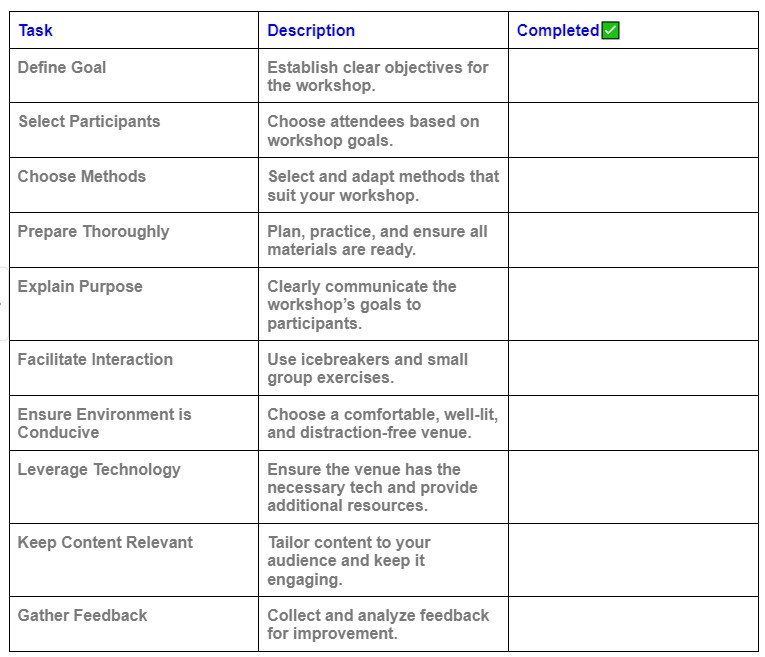
Key Takeaways
The key to any successful workshop is preparation—no surprises there. For a workshop that is both engaging and impactful, consider these crucial factors:
- Time: Plan your schedule carefully to make the most of your allotted time
- Content: Ensure your material is relevant, clear, and engaging
- Location: Choose a venue that supports your workshop’s needs and goals
- Environment: Create a setting that is comfortable and conducive to learning
- Participation: Encourage active involvement from all attendees
- Flexibility: Be ready to adapt your plans based on participant feedback and unforeseen circumstances
By applying these tips from our seasoned experts, you can organize workshops that not only succeed but also leave a lasting impression on your participants.
Are you excited to create a memorable and productive event? Go ahead and book the perfect venue, and with our tips in hand, feel confident as you host a fantastic workshop. You’ve got this!


